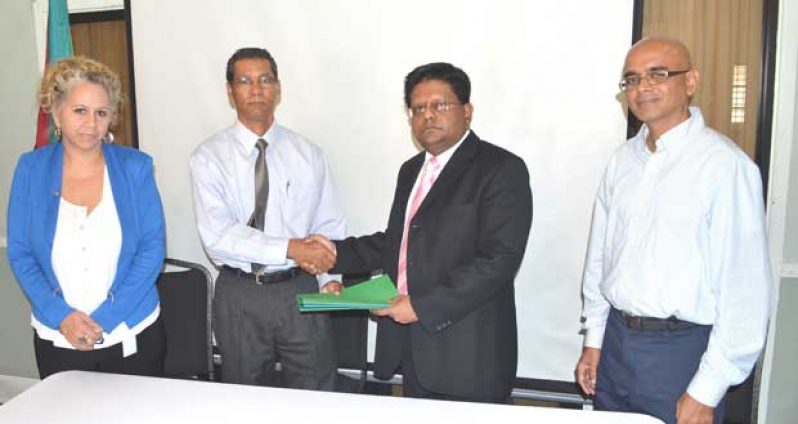– agreement signed by Gov’t,conservation international and GBTI.
THE Government of Guyana, in collaboration with the Guyana Bank for Trade and Industry (GBTI) and Conservation International (CI)-Guyana Inc., yesterday launched the $60M Rupununi Innovation Fund (RIF). The fund will provide financing and technical support for local and community-based agriculture and tourism enterprises to enable their participation in and support of Guyana’s Low Carbon Development Strategy (LCDS).
The fund will support sustainable agriculture; agro-processing; marketing; sustainable fisheries; sustainable management of forests, savannahs and other ecosystems; agro-forestry; nature-based and agro-tourism and arts and craft. The development of these enterprises is intended to develop greater synergies among other low-carbon development initiatives, to contribute to the maintenance of ecosystems and to foster good business practices.
Minister of Finance, Dr. Ashni Singh, who signed on behalf of the Government, saluting the collaboration among the partners to establish the RIF, lauded the benefits it will bring to the Rupununi region, the people of that

region, and the larger national economy. “Region 9 represents a major center of economic growth potential for Guyana, with its capital, Lethem, already showing indications of rapid growth being positioned as it is as the gateway between Guyana and Brazil.” The Minister also noted that such partnerships are seen by the Government as critical to pursuing public policy objectives. He said, “Today we speak of public/private partnerships, but they are not only to be viewed in the narrow traditional sense of mobilising private capital to achieve public policy objectives, but can be also seen in the context of collaboration such as this.”
He further stressed that the significance of the partnership formed through the process of establishing the RIF should be embraced and replicated: “It represents a partnership with a large international NGO in Conservation International- Guyana, a major hemispheric developmental institution through the IDB, a major partner in the financial services sector in Guyana, and a major Corporate Citizen of Guyana through GBTI, and of course, a partnership with the Government of Guyana.” The Finance Minister called on other private corporations to take a page from this and similar initiatives to likewise explore corporate initiatives that can enhance development of Guyana.
It is envisaged that with the assistance to be provided, sustainable agricultural and tourism enterprises will be created and existing enterprises will be enhanced. These enterprises are expected to contribute to the Government’s efforts to develop a national green, low carbon economy, while at the same time enhancing the well-being of the people of the Rupununi.
The Rupununi Innovation Fund represents a unique partnership between the Government, through the provision of a waiver of corporate taxes on the income earned from loans granted under the fund; GBTI by investing $60M to the fund as seed capital; CI-Guyana by co-financing and executing the US$1.6M Inter-American Development Bank Multilateral Investment Fund (IDB-MIF) Rupununi Livelihoods Project.
The fund is a critical component of the ‘Leveraging Natural Capital in Guyana’s Rupununi’ Project, currently being implemented by CI-Guyana, with funding from the IDB-MIF and the Swift Family Foundation. The project seeks to demonstrate that natural resource-dependent local and indigenous communities in the Rupununi can enhance and sustain their livelihoods, while maintaining the capacity of the Rupununi to provide environmental services such as carbon sinks and bio-diversity habitats.
Also at the signing, Mr. John Tracey, Chief Executive Office of GBTI said, “When in 2006, the Guyana Bank for Trade and Industry Limited opened a Branch in Lethem, Rupununi, it was in recognition of the potential of the Rupununi for tourism, agriculture and commerce and, by its geographical position, our gateway to Brazil and further south.
“GBTI’s banking philosophy of community banking has always been founded upon an understanding of the environment in which we operate and the tailoring of our banking services to suit, as far as possible, the needs and aspirations of the community. We seek at all times to make ourselves a partner in development and are fortunate that in the Rupununi, we have a partner in Conservation International, whose experience and understanding of this environment far outweigh our own, and has allowed us to fashion a unique fund, The Rupununi Investment Fund, to foster economic development of the region in an environmentally friendly way.
“We wish to thank the Government of Guyana for its support in the form of a waiver of taxes on interest charged, so that an interest rate suited to this developmental lending activity can lead to maximum benefits to the participants.”
Vice President and Executive Director of Conservation International-Guyana, Dr. David Singh, in his remarks said, “Conservation International–Guyana is particularly pleased with the partnership with GBTI and the continued support of the Government of Guyana, in support of the country’s efforts to build a sustainable future. Guyana, particularly the Rupununi, is one of few places in the world where people can demonstrate how to fulfill their interests in improving livelihoods, contributing meaningfully to the national economy, while maintaining ecosystems. We will learn many lessons and examples of good business practice from working with the people of the Rupununi, and we thank them for providing the institution with this opportunity.
The people of the Rupununi have a strong history of conservation, culture, and tradition. There is much that we can learn from the region, especially as the Government continues its efforts to transform village economies along a healthy sustainable path. The emphasis of the project on local and indigenous community based tourism and agriculture enterprises recognizes the potential of the region to increase its contribution to both of these sectors.












